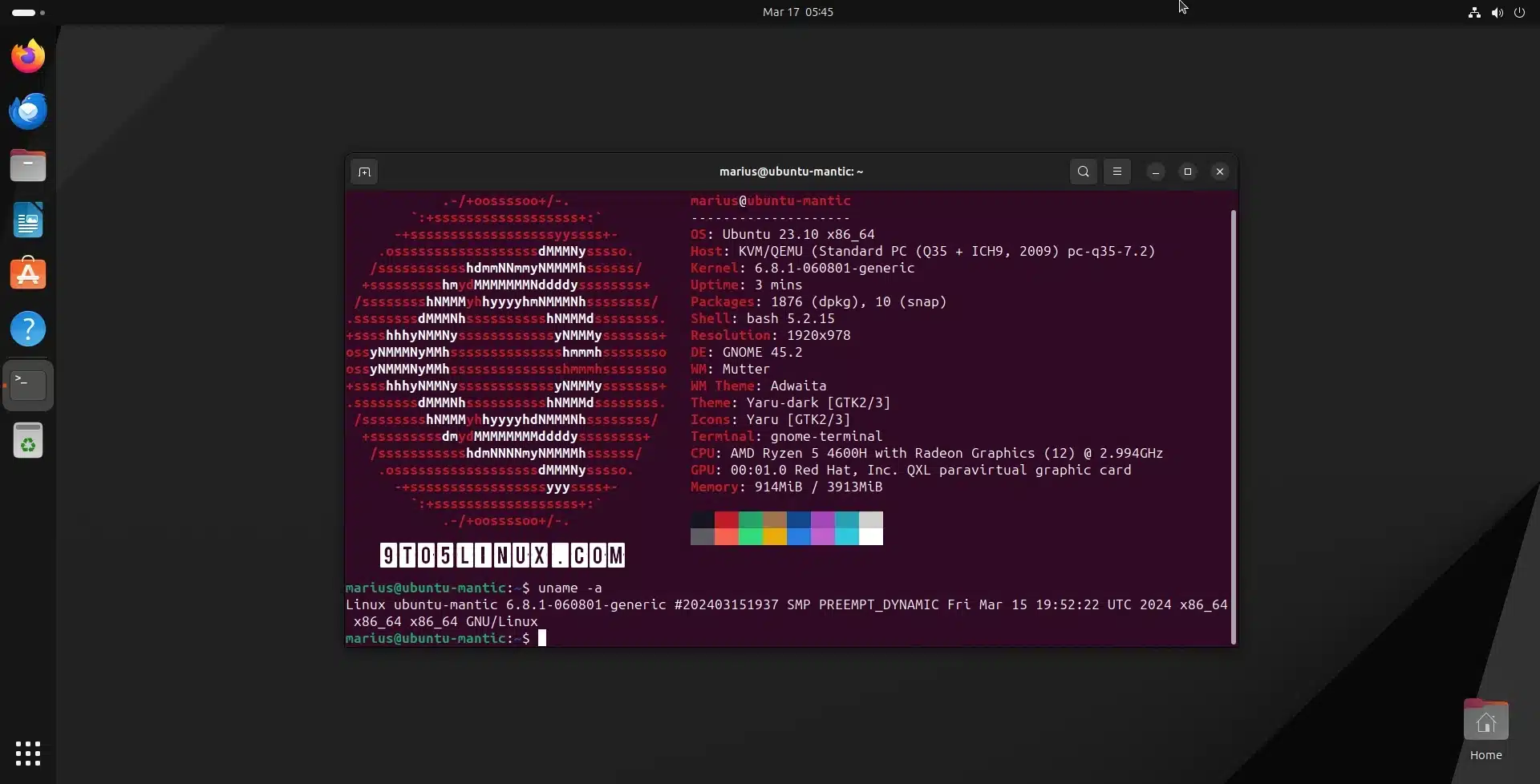Linux 6.8 is now the latest stable kernel and Ubuntu users can now install it on their machines via Canonical’s Ubuntu Mainline Kernel PPA archive. Here’s a quick tutorial on how to achieve that using the GUI or the command line.
Linux kernel 6.8 was released on March 10th, 2024. It introduces new features like LAM (Linear Address Masking) virtualization and guest-first memory support for KVM, support for the Broadcom BCM2712 processor in Raspberry Pi 5, zswap writeback disabling, fscrypt support for CephFS, a new Intel Xe DRM driver, as well as numerous other new and updated drivers for better hardware support.
And now you can install Linux kernel 6.8 on your Ubuntu system if you need hardware support or just want to use one of the new features. I’ve tested this tutorial on a 64-bit Ubuntu 23.10 machine and it worked like a charm. Packages are also available for ARMhf, PowerPC 64-bit Little Endian (ppc64el), and IBM System z (s390x) architectures.
I must warn you that these kernels are produced with no warranty by the Ubuntu Kernel Team. They will NOT offer support for these kernels in case you have issues, and they will NOT be held responsible for any damages these kernels may cause due to improper installation or use.
Also, you should be aware that these kernels aren’t signed, so you’ll need to disable Secure Boot to install them. However, the good news is that Linux 6.8 will be the default kernel of the upcoming Ubuntu 24.04 LTS (Noble Numbat) operating system series, so you should not have any issues with this kernel.
The easiest way to install Linux kernel 6.8 on your Ubuntu computer is by using a graphical tool called Mainline Kernels, which you can install from this PPA by running the commands below in the Terminal app. Open the Terminal app and run the following commands to install the Mainline Kernels tool:
Once the Mainline Kernels tool has been installed, you can open it from the applications menu of your Ubuntu system. The tool will quickly check the availability of new kernel versions from Canonical’s Ubuntu Mainline Kernel PPA archive and will list Linux 6.8.1 at the top, which is the latest stable kernel version at the moment of writing.
Click on the “Linux kernel 6.8.1” entry to select it and then click on the big “Install” button on the right to install the new kernel on your Ubuntu machine. Wait for the installation to complete and then reboot your computer.
Opting for this approach ensures you get the latest kernel versions (like Linux 6.8.2, 6.8.3, and so on) as soon as they are made available upstream. What’s more, if you activate the notification setting in the Mainline Kernels tool, you’ll be notified of new Linux kernel versions.
The alternative method is suitable for advanced users who prefer not to use the Mainline Kernels tool mentioned in the first method. This option could also serve as a backup plan in the event where the Mainline Kernels tool fails to capture the newest kernels from the Ubuntu Mainline Kernel PPA archive.
Under this method, you are required to manually retrieve and install kernel packages that are suited for your specific architecture straight from the authentic Ubuntu Mainline Kernel PPA archive for Linux kernel 6.8, then manually installing them on your system via the command line.
As an instance, if you are to install Linux kernel 6.8.1 on a 64-bit (amd64) Ubuntu system, you would have to download the packages mentioned below via the Ubuntu Mainline Kernel PPA archive. Proceed to create a folder in your Home directory and download the packages there.
Once you have downloaded all the kernel packages in the respective folder, you can install them all at once by running the sudo dpkg -i *.deb command in the Terminal app or from a virtual terminal, assuming you have first navigated to the folder where the kernel packages have been downloaded.
When the installation is complete, reboot your system.
If you experience any issues with Linux kernel 6.8 and you want to go back to Ubuntu’s default kernel or another kernel that’s installed on your system, press the Esc key when your computer boots to view the boot menu, then access the “Advanced options” boot entry and select a different kernel version from the list of available kernels.
ColoCrossing excels in providing enterprise Colocation Services, Dedicated Servers, VPS, and a variety of Managed Solutions, operating from 8 data center locations nationwide. We cater to the diverse needs of businesses of any size, offering tailored solutions for your unique requirements. With our unwavering commitment to reliability, security, and performance, we ensure a seamless hosting experience.
For Inquiries or to receive a personalized quote, please reach out to us through our contact form here or email us at sales@colocrossing.com.

